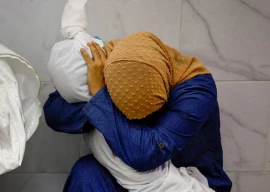
ISLAMABAD:
In what appears to be a scathing indictment of government-run businesses, a Senate Commerce Committee panel has ordered the state-owned AAA-rated State Life Insurance Corporation to withdraw its Rs4 billion term deposits in the state-owned AAA-rated National Bank of Pakistan, terming the investment “too risky”.
The decision was taken at a hearing of a subcommittee of the commerce committee, where senior SLIC officials laid out the current state of the insurance company’s investment portfolio and investment strategy. The subcommittee, headed by Senator Ilyas Bilour (ANP, Khyber-Pakhtunkhwa), also ordered State Life to withdraw Rs200 million in deposits from Summit Bank and keep a close watch on its Rs470 million deposit at Bank Alfalah.
The orders were issued by Senator Bilour without any reason. His order came after State Life’s investment manager informed the committee that the insurance giant had about Rs4 billion in fixed deposits at National Bank.
The senator’s comments have now created the danger of a run on the largest bank in the country. While most of National Bank’s deposits belong to government institutions, which are unlikely to move their money anytime soon, any doubts raised about financial strength of National Bank may cause a potential freezing of the entire banking system and cause a sharp contraction of economic activity in the country.
A spokesperson for the National Bank could not be reached for comment, despite multiple attempts to contact them by The Express Tribune.
The Senate panel at least offered some reasons for its objection to the deposits at Summit Bank, saying that the bank was still new and thus too risky for the money of policyholders to be invested there.
State Life is one of the largest institutional investors in the country, with about Rs273 billion ($3 billion) in assets under management. About 62% of that, or Rs169 billion, is invested in government bonds.
The Senate panel also criticised State Life’s policy of buying and holding stocks, rather than actively trading them to earn higher returns.
“When people were making billions of rupees in the stock market, State Life Insurance’s decision to sit on shares caused losses to the policy holders,” said Senator Haroon Akhtar Khan of PML-Q, himself a qualified actuary.
The remarks by Senator Haroon are somewhat surprising, since insurance companies are – by definition – conservative investors that take positions in stocks for the long term, rather than engaging in short-term trading. This fact was alluded to by State Life Chairman Shahid Aziz Siddiqi, who defended his institution’s investment policies, though he agreed that at times the company would have been better off by realising some of the capital gains.
Siddiqi pointed out that the insurance company had been approached several times to finance the government’s pet projects, such as the Iran-Pakistan pipeline, but had refused since those projects do not meet the company’s investment criteria. In addition, despite repeated approaches, State Life had also refused to place any deposits in the troubled Bank of Punjab.
The parliamentary panel also sought a report from the Securities and Exchange Commission of Pakistan about what actions it took against First Dawood Islamic Investment Bank for defaulting on payments to the State Life.
State Life’s investment head said that First Dawood Investment Bank had defaulted on a Rs100 million principal payment due to State Life and that the SLIC management had taken the matter to court.
Siddiqi said that the management was trying to expand insurance coverage in the country and was negotiating with National Database and Registration Authority to provide a minimum of a Rs25,000 life insurance policy on each identity card. He said the premium would be arranged by increasing cost of the identity card, which approximately 72 million Pakistanis currently hold.
Published in The Express Tribune, January 12th, 2012.
COMMENTS (9)
Comments are moderated and generally will be posted if they are on-topic and not abusive.
For more information, please see our Comments FAQ



































































Please get those politicans out of business. They are just doing nothing more than destroying the economy. Collapse of National Bank means distruction of whole economy. and i sont think there is any other Bank in Pakistan strong enough to hold Government's huge deposits.
@Mubeen Amjad: Absolutely, what I don't understand is that parliaments job is of legislative nature. They keep forgetting that.
“The Senate panel also criticised State Life’s policy of buying and holding stocks, rather than actively trading them to earn higher returns.”
Unlike investment firms, insurance companies take positions in stocks to match dividend income against claims and other periodic outflows. This is outrageous and speaks volume about their ineptness and lack of basic knowledge of what they are responsible to oversee. Mismanaging even one of national bank or state life insurance can put the already troubled economy on the brinks and will have significant repercussions.
Good Decision in light of facts.
Another Nobel Idea.
First They theft TV licence fee through Electricity bill. Now we are insured Against What. No body knows. Still we have to Pay to NADRA ??????? And life of common pakistani goes on....
This happens when politicans with no economic back-grounds try to run economic committee of parliament
Great, now these gifted politicians are out to ruin two great state institutions in one go. Guess they missed out that actuary's degree in the verification process.